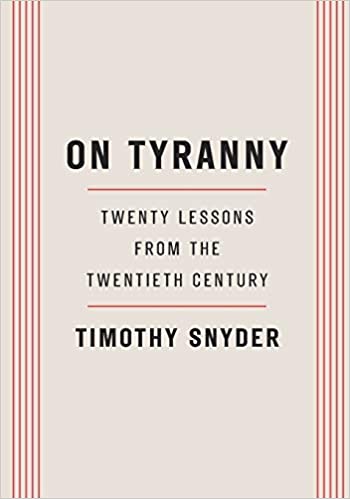Timothy Snyder – On Tyranny Audiobook
Timothy Snyder – On Tyranny Audiobook (Twenty Lessons From the Twentieth Century).

On Tyranny Audiobook
This publication is an absolute must-read for anyone interested in learning from the mistakes made by terrible autocrats in the past. We also ask our agents to ensure that they don’t make similar mistakes in the future. book. When I first started to review it, I had appointments. I was reluctant to believe that the author had an agenda. He also wanted me to see the world through his lens. After five pages, I realized that this was not the case. This is the mark of a completely non-partial background book To end up the book I don’t know what political event the writer is identifying with. When I was done, that held true. It is what it should be. Guide is well written by a writer who clearly has extensive knowledge about the subject matter. I was able to read it in one night. It was so captivating that I could not put it down. On Tyranny Audiobook Free. Two judges, one from the household and one from the criminal courts suggested it to me. Now my entire office has seen it. This publication is a must-read for anyone who appreciates the importance of learning about background and not repeating it. This is a quick, concise guide. book Check out these other options: 30-45 minutes of you time. It’s only $2.99 on Kindle so you won’t regret buying it. For those who found his list of 20 points elsewhere online free Don’t forget to add commentary. Guide also adds commentary to the list. It’s well worth the small price.
If you are not familiar with SnyderHe is a chronicler of Eastern Europe. He has also written extensively about the turmoil and the murder fields of Eastern Europe during the 20th century. He understands what he speaks.
I will share with you some of his thoughts, starting from his closing statements. He refers to “the national politics that inevitability” when he addresses the issue.
We Americans were convinced that there would be no future except more of the exact same. It seemed that the far-off injuries of fascism and Nazism as well as communism were receding into irrelevance. We accepted the politics of inevitability. It was the belief that history could only move in one direction, toward liberal democracy. In 1989-91, communism in eastern Europe came to an abrupt halt. We were able to ingest the myth of an “end in background”. Doing so reduced our defenses, constrained creativity, and broke the ice to allow for exactly the kind of regimes that we were told we would never return.
Snyder, Timothy. On Tyranny: Twenty lessons from the Twentieth Century, Kindle Locations 765-769). Crown/Archetype. Kindle Version.
However, he then considers the reverse perspective, a concept he refers “the politics infinity”. This mindset he says
The seduction of a mythicized history in the politics for infinity prevents us thinking about possible futures. The temptation to dwell on victimhood reduces the desire for self-correction. The country is defined by its core merit rather than its future potential. National politics becomes a discussion about good and evil, not a discussion about possible solutions to actual problems. The dilemma is unreversible. Planning for the future seems difficult and perhaps disloyal. How can reform be considered when there is always an adversary?
Id. at 810.-815
He places background, an encomium with me that I might not even agree, in contrast to both these mindsets:
Timothy Snyder – On Tyranny Audio Book Online. Both these placements, inevitability as well as infinity, are antihistorical. Only background can stop them. Background allows us to both see patterns and make judgements. It helps us see the frameworks within which we can seek freedom. It gives us minutes of information, each one different, and none completely unique.-Of-You can find more information at-kind. To be able to understand one moment is to have the potential of creating another. Our background gives us the ability to be accountable for anything, except for some thing. The Polish poet Czesław Miłosz assumed that such a concept of obligation worked against isolation and also indifference. The history of people who have done and suffered much more than us is a fascinating read. This discredits the idea that freedom can be given up in the United States or in any other country. One detail I keep considering: SnyderThere is much debate over whether the evisceration or embarrassment of privacy and personal identity is a fascist tactic. Consider that the e-Mail violations since the last election or why doxing is used to select among cyber brownish shirts. Another: The long and terrible history of dismantling legislation and defenses of it as “exceptions”, which quickly become permanent due to safety and security emergency situations. It is possible that Americans will be examined in this particular matter sooner than later. In just a few short months, freedom can become totalitarianism. It’s not too late to defend institutions, fair voting, and the principles of your profession.
